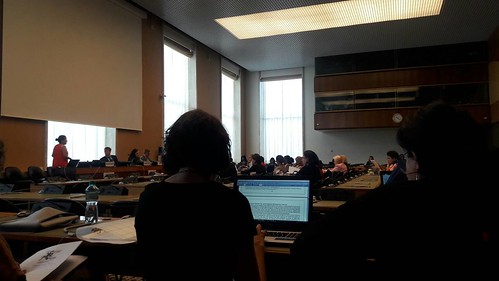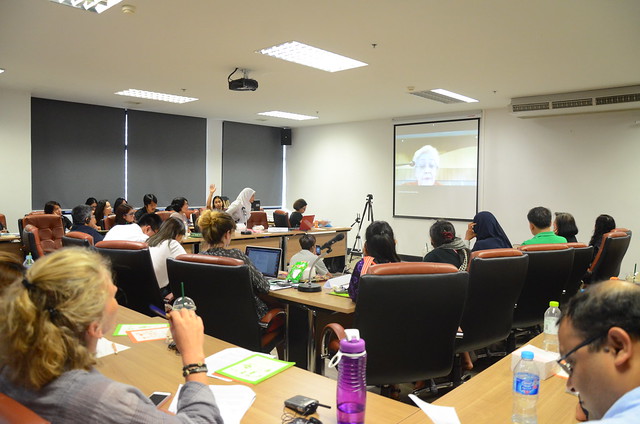Under the junta regime, women suffer injustice and human right violations significantly more than men due to lack of legal protection and social discrimination, according to women’s rights reports to UN.
On 4 July 2017, representatives of Thai women’s right NGO read a statement in The Convention on the Elimination of All Forms of Discrimination (CEDAW) at the UN headquarters in Geneva. The statement argued that discrimination against women in Thailand still exists in many levels though the country has ratified CEDAW for 32 years.
The statement also claimed that since the 2014 coup, the fight against gender discrimination has been even more difficult. Though the junta approved Gender Equality Act in 2015 with an aim to improve women’s rights, other legal mechanisms such as martial law, Section 44 of the Interim Charter and junta orders still threaten women’s fundamental rights.
“We are concerned by the fact that the state uses security strategies [as an excuse] to suppress freedom of expression of women, as well as others in the society. Plus, there are impunity culture and systemic corruption. These methods lead to further discrimination and violence against women. The patriarchal system still takes root deeply in Thai society,” read the statement.
I a day after, a group of women’s rights NGOs hosted a public forum at Political Science Faculty’s Chulalongkorn University. There was a live streaming of the CEDAW and a reflection session of women’s rights advocates from various fields. The scopes of the organisations varied from sex workers, ethnic minorities, domestic violence, female inmates to migrant workers.

Sex workers: lack of legal protection
Sex workers: lack of legal protection
Female sex workers usually experience human rights violation committed by police officers. During the past six months, there have been 19 cases of authorities pretending to be customers and having sex with workers before arresting them. Over 200 workers were arrested by this controversial method.
Chatchawan Mueangchan from Empower Foundation said that as prostitution is illegal in Thailand, the authorities are able to take advantage from sex workers. The lack of legal protection also prevents workers from reaching fundamental welfare and being a witness in human trafficking lawsuits.
Thridsadi Sawangying from Health and Opportunity Network urged that Thailand should abolish Prevention and Suppression of Prostitution Act, which have been enacted since 1996, in order to create a better work condition for sex workers.
“We’re pushed into a grey area because of the Prevention and Suppression of Prostitution Act. The ambiguity in law enforcement makes sex workers experience disadvantages, from both pimps and law enforcers. Plus, they are doubly victimised and labeled by local media,” said Thridsadi.
Ethnic minorities: rights to live with forests
In 2014, the junta issued the Order 66/2014 to suppress deforestation. The order has led to numerous prosecution against ethnic minorities who lived in forests for generations. Those prosecution usually happen to women more than men.
According to Kanlaya Chularattakorn from Indigenous Women Network of Thailand (IWNT), female ethnic minorities have already suffer from stereotype that they are involved in drug trades, human trafficking and illegal land encroachment. The junta’s order therefore has pushed their lives into even further hardship.
Khatima Licha, a female ethnic minority, explained that the junta order does not a problem to only women, but their whole family. She added that the government should grant local people the right to manage and take benefit from local resources, rather than expelling them from their homeland.
“The Order 66/2014 has taken away our farmlands. The impacts are not only on women but a whole family. [The authorities] confiscated our lands and woods for building houses. We live with forests but can’t take benefit from the forests. How can we send our children to school? How could parents even live? In addition, we were prosecuted. The laws don’t go along with our way of life at all,” said Khatima.
Domestic violence: women’s rights undermined by family
Busayapa Srisompong said that the 90 per cent of domestic violence victims in Thailand are female but the legal system cannot not provide them a proper protection. Thailand’s Protection of Domestic Violence Act tries to preserve family institution, together with protecting victim’s rights, which, according to Busayapa, is a contradiction.
The act allows victims to compromise and end the prosecution on volunteer basis. The law enforcers in many cases, therefore, convinced victims to cease the prosecution. Even in the case of divorce, officials usually try to convince women to remain in a relation they want to opt out.
Busayapa added domestic violence should not focus only on spouses. In many cases, female migrants who work as housemaid are violated in domestic areas without any legal protection.
“On migrant workers issue, I’d like to focus on household workers. Does Protection of Domestic Violence Act include these people? Migrant workers have the highest risk of being abused [but] they’re not clearly included in definition of family members and not protected under labour laws as well,” emphasised Busayapa.
Female inmates: right to healthcare
Thiprachaya Suphanitsirikul from Fairy Tell group said that the work to promote inmate rights is a difficult task as prison regulations prohibit inmates from revealing inside problems to the public. However, the most concern of her group is the health condition for female prisoners.
“The classification of inmates’ health is not thoroughly operated. There is only initial external health check when inmates arrive the prisons. Internal health check only aims to search for prohibited stuff (like drugs), not a legit health check,” explained Thiprachaya.
She added that sick inmates will be detected only when their symptoms are obvious but the chance of seeing doctors is anyway low. Only emergency or life-threatening cases have a high chance of reaching legit doctors. Those who are not allowed to see doctors only receive paracetamol, painkillers and anti-infectives.
“I my own cases, my tooth had broke for six months but I’d never seen a doctor. All I got was painkillers,” stated Thiprachaya.
Female human rights defenders face intimidation from state and corporates
Sirikarn Charoensiri from Thai Lawyers for Human Rights pointed that the junta and private sectors have pushed harsher intimidation on human rights defenders. One of the tactics, which was increasingly used after the coup, is to filed a lawsuit against them. The laws that were commonly used include defamation law, sedition law, Computer Crimes Act, and junta orders.
Apart from legal intimidation, assassination of human rights defenders also happened occasionally but murderers and hirers are less likely to be prosecuted, adding that female human rights defenders suffer twice than men as most of them have to take care of her children as well.
“There was a murder of female who was a member of Farmers Confederation in the South but the [the case] proceed very slowly. This proves that Thai state fails and has not sincerity to bring the culprits to receive punishment,” said Sirikarn.

The reflection session at Political Science Faculty














